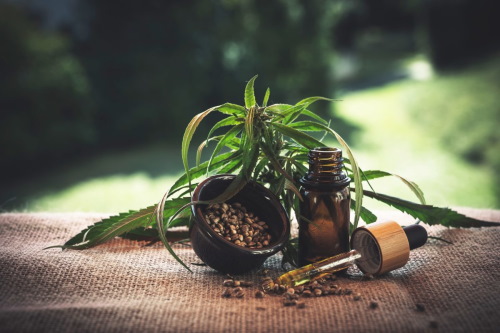People with rheumatoid arthritis may turn to CBD to relieve symptoms. But does it help? Learn what the science says and what experts recommend.
CBD and rheumatoid arthritis
About 1.3 million Americans have rheumatoid arthritis, an autoimmune condition that brings with it pain, inflammation and, over time, joint damage.
BREAKING: Newly Legalized Herb Relieves Pain - Available Without A Prescription
While there are medications to ease symptoms and even help prevent damage, some people also try alternative treatments, including cannabidiol (CBD).
In one Arthritis Foundation poll, almost one-third of arthritis patients, including many with rheumatoid arthritis, said they currently used CBD. That number rose to 80 percent when including people who currently use it as well as those had used it in the past or are planning to try it in the future.
Here’s what you should know if you’re considering CBD for rheumatoid arthritis.
What is CBD?
Cannabis, or marijuana, contains two main active ingredients, the first and perhaps best known being delta-9-tetrahydrocannabinol (THC). This is what gives marijuana its “high.”
The other main ingredient, CBD, doesn’t make you high, but seems to have other effects in the body.
In the United States, most CBD comes from hemp, a cousin of the cannabis plant with little or almost no THC.
CBD and inflammation
In the Arthritis Foundation poll, some respondents reported they slept better, had improved physical function, and felt better overall while taking CBD. A few also said they had less pain and stiffness. Along with this anecdotal information, preliminary studies support the idea that CBD may help rheumatoid arthritis symptoms.
“CBD is a very potent anti-inflammatory,” says Martin A. Lee, co-founder and director of Project CBD and author of Smoke Signals: A Social History of Marijuana–Medical, Recreational, and Scientific.
One article published in 2019 in Current Opinion in Rheumatology suggested that CBD may exert this anti-inflammatory effect by activating cannabinoid type 2 receptors (CB2), which are part of the body’s endocannabinoid system that regulates and balances body functions like your immune response.
Activating these receptors lowers the production of cytokines, which play a role in inflammatory diseases like rheumatoid arthritis.
This fits with an earlier (2014) laboratory study in BMC Musculoskeletal Disorders that found that CB2 receptors are expressed more in the synovial tissues of the rheumatoid joints.
“The synovium is the sac in a joint that provides cushioning for the joint,” says Bonni Goldstein, MD, medical director and owner of Cannacenters and author of Cannabis is Medicine: How Medical Cannabis and CBD are Healing Everything from Anxiety to Chronic Pain.
CBD and autoimmunity
“CBD also modulates the immune system,” says Lee. “It dials it down a little bit, as if it were a dimmer switch.” This is key when you’re talking about autoimmune diseases like rheumatoid arthritis, which involve an overactive immune system attacking the body’s own tissues. In the case of rheumatoid arthritis, the body attacks the joints.
Currently, most of what we know about CBD comes from laboratory-grown cell and animal studies, not human studies. That’s largely due to the federal restrictions on CBD, and it means that we have very little data from humans, says Dr. Goldstein.
Guidance for CBD and rheumatoid arthritis
The Arthritis Foundation issued its first CBD guidance for adults with arthritis in 2019, stating that, while “there have been no rigorous clinical studies in people with arthritis to confirm this,” many people with symptoms related to arthritis (such as anxiety, insomnia, and pain) have benefitted from CBD products.
The guidance also pointed out that CBD can interact with different drugs and should not be used to replace medications that help prevent joint damage.
The group suggests always working with your health care provider and starting with a low dose. They also recommend buying from companies that have their products tested by independent labs to confirm the purity of ingredients, strength, and safety (and provide a certificate of analysis to prove it).
Is CBD safe?
As long as you’re talking about legitimate CBD products, the answer is mostly yes. But it’s important to understand that commercially available products are not well regulated, so it can be hard to know if a product contains the amount of CBD stated on the label.
Like any treatment, prescription or otherwise, CBD can have downsides. Possible side effects include feeling lightheaded or sleepy, having a dry mouth and, rarely, liver problems. Studies that have explored CBD for epilepsy and psychiatric conditions in humans have also reported diarrhea and vomiting, according to a 2019 review article in Current Neuropharmacology.
It’s important to know that CBD can also interact with different medications, including some commonly used to treat arthritis, such as corticosteroids, Xeljanz (tofacitinib) for rheumatoid arthritis, and the nonsteroidal anti-inflammatory drug (NSAID) Aleve (naproxen). The National Library of Medicine has a full list of potential interactions. This is one of many reasons why it’s important to talk with your doctor before trying CBD.
Is it legal to buy CBD?
The legality of marijuana and its components is constantly in flux. So far, 36 states, plus the District of Columbia, Puerto Rico, Guam, and the U.S. Virgin Islands, have legalized medical marijuana (and therefore CBD), a number which could easily change as other jurisdictions consider similar moves. Other states allow the use of products that have high CBD but low THC content, but only for medical reasons.
To confuse the issue further, the federal Drug Enforcement Administration (DEA) has not relaxed its stance and still lists marijuana and all its components (including CBD) as Schedule 1 drugs under the Controlled Substances Act. That means there’s high potential for abuse and no accepted medical use. (There is one exception. The CBD drug Epidiolex has been approved by the Food and Drug Administration for rare forms of childhood epilepsy.)
CBD that comes from hemp is regulated differently, however. Under the 2018 Farm Bill, hemp products that contain no more than 0.3 percent THC are not considered controlled substances under federal law. That said, some states restrict buying of hemp-based CBD products.
Types of CBD products
The Arthritis Foundation points to four main categories of CBD products: those taken by mouth (capsules and edibles), those that go directly into the bloodstream (under-the-tongue tinctures), those that are applied to your skin, and those that are inhaled via a vaporizing or vape pen.
Typically, ingested products take longer to act because they’re absorbed through the digestive tract. Sprays and tinctures that go directly into your bloodstream may act in as little time as 15 to 45 minutes. Vaping also acts quickly, but the group cautions against it because of the history of hospitalizations and deaths due to vaping-related lung disease.
Most people who responded to the Arthritis Foundation poll said they used liquid or topical preparations. This makes sense given that liquid would have more of a system-wide effect while creams and similar products applied directly to the joint may help relieve breakthrough pain, says Dr. Goldstein.
Each CBD product comes in either full-spectrum, broad-spectrum, or isolate form, depending on the array of ingredients:
- Full-spectrum CBD: This contains all of the components of the hemp plant (Cannabis sativa), including CBD and small traces of THC and terpenes, which are plant compounds.
- Broad-spectrum CBD: This includes all of the components of the hemp plant except THC.
- CBD isolates: The purest form of CBD, this contain only CBD.
Many people find full- and broad-spectrum products more effective because the different ingredients work together for an added or “entourage” effect, says Lee.
CBD dosing
Doses can vary greatly between forms of CBD and between individuals. CBD has been studied as a treatment for sleep problems, anxiety, and pain in a wide range of doses, from less than 1 mg per day to 1,000 mg per day or more.
Higher doses can lead to side effects like sleepiness (and can be expensive), so experts generally recommend using CBD at the lowest effective amount.
The Arthritis Foundation recommends starting with just a few milligrams twice a day under your tongue.
Check the label to find out how much CBD one dose of a product contains. It could be a dropper, a capsule, or gummy.
How to buy CBD
Once you’ve decided on the type of product you want to try, make sure you’re buying a quality item. This requires some legwork. “It’s a question of being a conscious consumer,” says Lee. “You have to do more due diligence.”
Here are some purchasing guidelines from Harvard Medical School and the Arthritis Foundation:
TRENDING: Big Pharma In Outrage Over This Breakthrough Natural Painkiller
- Buy from companies that have Good Manufacturing Practices certificates, indicating they conform to voluntary quality standards.
- Ask for a certificate of analysis (COA), which proves that the product has been tested by an independent lab for purity, strength, and safety.
- Always work with your doctor, and don’t discontinue other medications.
- Buy products manufactured in the United States with U.S.-grown ingredients.
- Stay away from companies that make health claims for specific products.
The bottom line
Right now, scientific evidence about CBD and rheumatoid arthritis comes mostly from lab and animal studies but if you do your research, work with a doctor, and find a good product at the right dose, you may notice improvements in sleep, quality of life, and more.









